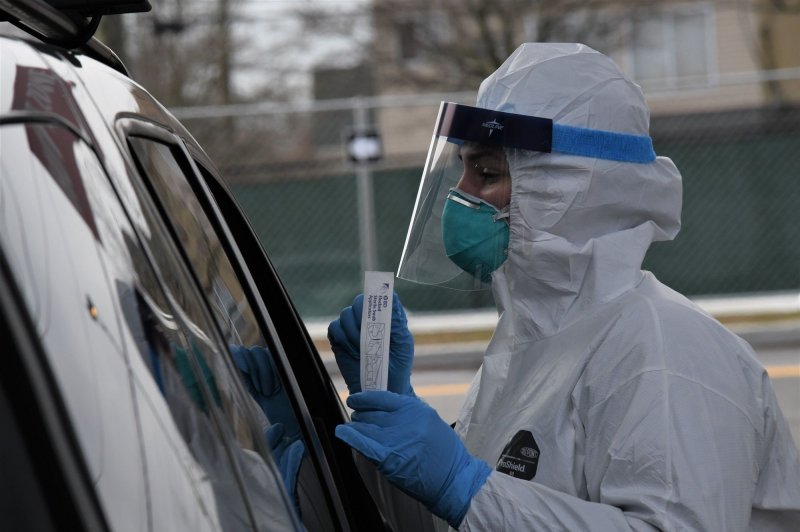Staff Sgt. Meghann Cinnamond, a member of the New York Air National Guard's 109th Airlift Wing in Scotia talks to a person about test sample collection at a drive-through COVID-19 testing center in Staten Island, N.Y., in March. File Photo by Maj. Patrick Cordova/U.S. Air National Guard/UPI |
License Photo
May 15 (UPI) -- Treatment with the hepatitis drug interferon-alpha-2b might speed recovery for people with COVID-19, a small study published Friday by the journal Frontiers in Immunology found.
Researchers in Wuhan, China, report that the drug significantly reduced levels of detectable virus in the upper respiratory tract, based on "experimental" treatment with 77 patients who had the disease.
The findings, researchers said, showed promise for interferon-alpha-2b -- which has been used against hepatitis and some forms of cancer, including melanoma -- as a treatment against COVID-19. They stressed that larger, controlled trials of the drug are needed.
"Interferons are our first line of defense against any and all viruses -- but viruses such as coronaviruses have co-evolved to very specifically block an interferon response," co-author Eleanor Fish, of the Toronto General Hospital Research Institute, said in a press release.
"This informs us of the importance of interferons for the clearance of virus infections," said Fish, who also is affiliated with and the University of Toronto's Department of Immunology. "Treatment with interferon will override the inhibitory effects of the virus."
Other forms of interferon, interferon-beta and interferon-beta-1b, have been studied for use in COVID-19 as part of a cocktail of drugs.
Fish and her colleagues first began to experiment with interferon-alpha-2b during the sudden acute respiratory syndrome, or SARS, outbreak in 2002-03. Like COVID-19, SARS was caused by a coronavirus, SARS-CoV-1.
In this study, researchers examined the course of COVID-19 disease progression in patients with confirmed infection admitted to Union Hospital, Tongii Medical College, in Wuhan between Jan. 16 and Feb. 20. All patients had moderate symptoms, meaning none required intensive care or oxygen supplementation or intubation.
Patients in the study were treated either with interferon-alpha-2b, the antiviral arbidol or a combination of the two. The researchers found that those who received interferon-alpha-2b as part of their treatment achieved undetectable levels of SARS-CoV-2 up to seven days faster than those who didn't receive the drug.
In addition, treatment with interferon-alpha-2b, either alone or in combination with arbidol, also cleared the virus faster than arbidol alone. Also, interferon-alpha-2 treatment "significantly" reduced levels of interleukin-6 and C-reactive protein, two inflammatory proteins found in the human body that become elevated in some with COVID-19.
Fish and her colleagues, however, emphasized that the findings need to be confirmed by a larger, randomized, controlled trial -- the gold standard for evaluating the safety and efficacy of a treatment -- before it can be considered for widespread use.
"Rather then developing a virus-specific antiviral for each new virus outbreak, I would argue that we should consider interferons as the 'first responders' in terms of treatment," Fish said.
"Interferons have been approved for clinical use for many years, so the strategy would be to 'repurpose' them for severe acute virus infections."















